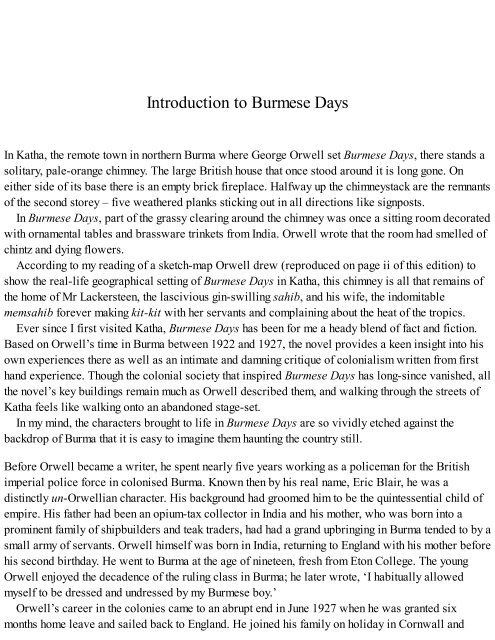563296589345
Create successful ePaper yourself
Turn your PDF publications into a flip-book with our unique Google optimized e-Paper software.
Introduction to Burmese Days<br />
In Katha, the remote town in northern Burma where George Orwell set Burmese Days, there stands a<br />
solitary, pale-orange chimney. The large British house that once stood around it is long gone. On<br />
either side of its base there is an empty brick fireplace. Halfway up the chimneystack are the remnants<br />
of the second storey – five weathered planks sticking out in all directions like signposts.<br />
In Burmese Days, part of the grassy clearing around the chimney was once a sitting room decorated<br />
with ornamental tables and brassware trinkets from India. Orwell wrote that the room had smelled of<br />
chintz and dying flowers.<br />
According to my reading of a sketch-map Orwell drew (reproduced on page ii of this edition) to<br />
show the real-life geographical setting of Burmese Days in Katha, this chimney is all that remains of<br />
the home of Mr Lackersteen, the lascivious gin-swilling sahib, and his wife, the indomitable<br />
memsahib forever making kit-kit with her servants and complaining about the heat of the tropics.<br />
Ever since I first visited Katha, Burmese Days has been for me a heady blend of fact and fiction.<br />
Based on Orwell’s time in Burma between 1922 and 1927, the novel provides a keen insight into his<br />
own experiences there as well as an intimate and damning critique of colonialism written from first<br />
hand experience. Though the colonial society that inspired Burmese Days has long-since vanished, all<br />
the novel’s key buildings remain much as Orwell described them, and walking through the streets of<br />
Katha feels like walking onto an abandoned stage-set.<br />
In my mind, the characters brought to life in Burmese Days are so vividly etched against the<br />
backdrop of Burma that it is easy to imagine them haunting the country still.<br />
Before Orwell became a writer, he spent nearly five years working as a policeman for the British<br />
imperial police force in colonised Burma. Known then by his real name, Eric Blair, he was a<br />
distinctly un-Orwellian character. His background had groomed him to be the quintessential child of<br />
empire. His father had been an opium-tax collector in India and his mother, who was born into a<br />
prominent family of shipbuilders and teak traders, had had a grand upbringing in Burma tended to by a<br />
small army of servants. Orwell himself was born in India, returning to England with his mother before<br />
his second birthday. He went to Burma at the age of nineteen, fresh from Eton College. The young<br />
Orwell enjoyed the decadence of the ruling class in Burma; he later wrote, ‘I habitually allowed<br />
myself to be dressed and undressed by my Burmese boy.’<br />
Orwell’s career in the colonies came to an abrupt end in June 1927 when he was granted six<br />
months home leave and sailed back to England. He joined his family on holiday in Cornwall and









![Genki - An Integrated Course in Elementary Japanese II [Second Edition] (2011), WITH PDF BOOKMARKS!](https://img.yumpu.com/58322134/1/180x260/genki-an-integrated-course-in-elementary-japanese-ii-second-edition-2011-with-pdf-bookmarks.jpg?quality=85)
![Genki - An Integrated Course in Elementary Japanese I [Second Edition] (2011), WITH PDF BOOKMARKS!](https://img.yumpu.com/58322120/1/182x260/genki-an-integrated-course-in-elementary-japanese-i-second-edition-2011-with-pdf-bookmarks.jpg?quality=85)





